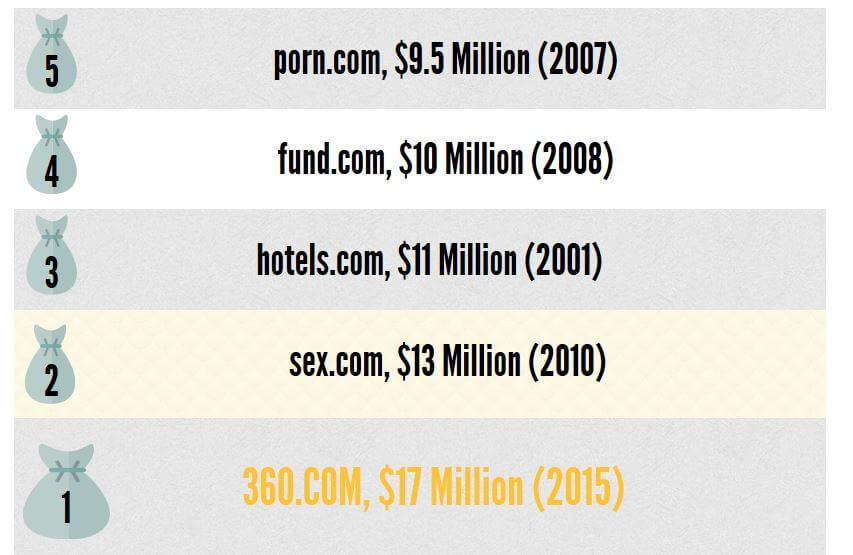With an explosion in domain names, from .London to er, slightly ruder versions, it's a nightmare picking a good one. UK2 Group boss Phil Male offers to help you get it right.
The Surprisingly Complex Business Of Naming Your Website
With an explosion in domain names, from .London to er, slightly ruder versions, it's a nightmare picking a good one. UK2 Group boss Phil Male offers to help you get it right.

Entrepreneurs and small businesses are in no doubt that they benefit hugely from having an online presence. There are 58.2 million internet users in the UK and more than 3.1 billion globally.
What’s less clear to many businesses is how to maximise the chances of target customers finding their website, and many fall foul of the most simple considerations. Success begins at the domain name you choose.
VeriSign released a comprehensive report in March which showed that by the end of 2014 the total number of registered domain names was 288 million. An additional 16.9 million registered domains were added last year alone, which means there’s a lot of competition out there to securing a domain that works well for you and your customers.
Unfortunately, choosing the perfect domain name for your business got a whole lot more complicated recently. The Internet Corporation for Assigned Names and Numbers (ICANN), which coordinates these unique identifiers globally, committed to releasing 1,930 new top level domains. However, most domain registrars (see source for common registrars) will offer advice on which TLD it is that you need based on your website’s purpose.
We used to have a more manageable 22 top level domains to choose from, such as .com, .co.uk, .fr and .gov, but so far this year almost 400 have been added to the menu, with hundreds more to follow.
"Good, short domains are exceptionally hard to find today"
You may have seen .london for example which is gaining popularity, as well, as descriptive words such as .restaurant and .plumber. However, there are a whole load of others like .porn and .sucks which are causing a lot of discussion in the media as to whether this level of expansion is a good thing for businesses.
There is concern it might open organisations up to fraud and counterfeiting since very few business will take defensive steps to acquire all 1,930 suffixes to protect their brand.
And the winner is…
The motivation for releasing the new domains was of course a commendable one. Good, short domains are exceptionally hard to find today and have been changing hands for eye-watering amounts of money. The europeandomaincentre.com lists the most expensive domain names to have ever changed hands.
Until recently, and perhaps predictably, sex.com topped the list and was bought for $13 million in 2010. However, it looks likely 360.com may have taken the top spot, having changed hands from Vodafone to Beijing Oihoo Company for a rumoured $17 million.
Given all the choice out there, what are the key things businesses should consider when choosing a website address or domain name?
A domain-led approach is best
We generally recommend a domain-led approach to getting online, which means buying a domain name that works well for your business right at the start.
You ideally want to avoid the situation some new businesses face that having spent a huge amount of time coming up with the perfect brand name, printing business cards and creating logos, they find they are unable to buy a sensible and affordable domain name to go with it - one that doesn’t have multiple words, numbers or hyphens.
Obviously, for established businesses this might not be possible unless you’re open to rebranding. In this situation, some of the new suffixes which ICANN has released such as .london might be an attractive and cost-effective option.
A word of caution about keywords
It’s perhaps not all bad news if you can’t secure common words such as “apple”; “plants” or “computers” in your domain name since you will need to undertake a huge amount of Search Engine Optimisation (SEO) activity to get your website listed on the first page of a Google search.
Take for example, a keyword such as “Donuts”. Companies such as Krispy Kreme and Dunkin Donuts feature on page one of a search alongside perfectly iced and mouth-watering images of doughnuts. Buried somewhere within all this is also the company called Donuts Inc which, perhaps ironically, is an internet domain name registry company.
It has no doubt worked hard on its SEO to ensure it features on the first page but it will need to continue this level of activity to avoid slipping down the rankings. Choosing a more obscure, but easily memorable name, is perhaps an easier route for smaller businesses.
Top tips for choosing a domain name
Our top tips for securing a domain name that enhances your brand are:
- Shorter domains are better. Avoid substituting words for numbers or letters and choose a name which is easily readable and sounds professional. It makes it so much easier for customers to remember your website address when recommending you to a friend or colleague.
- Pick a domain name that customers won't easily confuse with other businesses, and of course beware of infringing on another business' trademark. Use the World Intellectual Property Organisation's searchable database to undertake a few checks on your chosen name.
- If you can afford it, invest in the perfect domain name if it is available. The .com and .co.uk suffixes continue to be the best in terms of customer-friendliness but .biz, .info, or .uk are gaining popularity and will likely be a lot cheaper. While .org is now open to anyone, it was originally used to indicate a non-profit organisation so if this is relevant to you then it’s a sensible option as it adds legitimacy.
- Internet browsers don’t handle all the newly released suffixes consistently and mail systems sometimes reject them as invalid, so be cautious if choosing one of the more unusual ones. Do some research to check whether they are affected by this problem.
- Maximise SEO by using Google Trends and Google Keywords to find easily searchable or more commonly searched alternatives as well as expected search numbers.
- When choosing which domain registrar (companies like us here at UK2.net who sell domains), look to see if they are accredited, have been in business for a long time, and are offering a good selection of domains from which to choose.
- Be sure to register your trademark in the Trademark Clearinghouse (TMCH). Set up by ICANN, this is a single database of registered trademarks which offers your brand some level of protection.
Who would have thought there was so much to consider about one small element of an online strategy? It might look a bit daunting but if you follow the tips outlined here and choose a reputable domain registrar then you’ll have started your online journey in great shape.
Thanks for signing up to Minutehack alerts.
Brilliant editorials heading your way soon.
Okay, Thanks!



